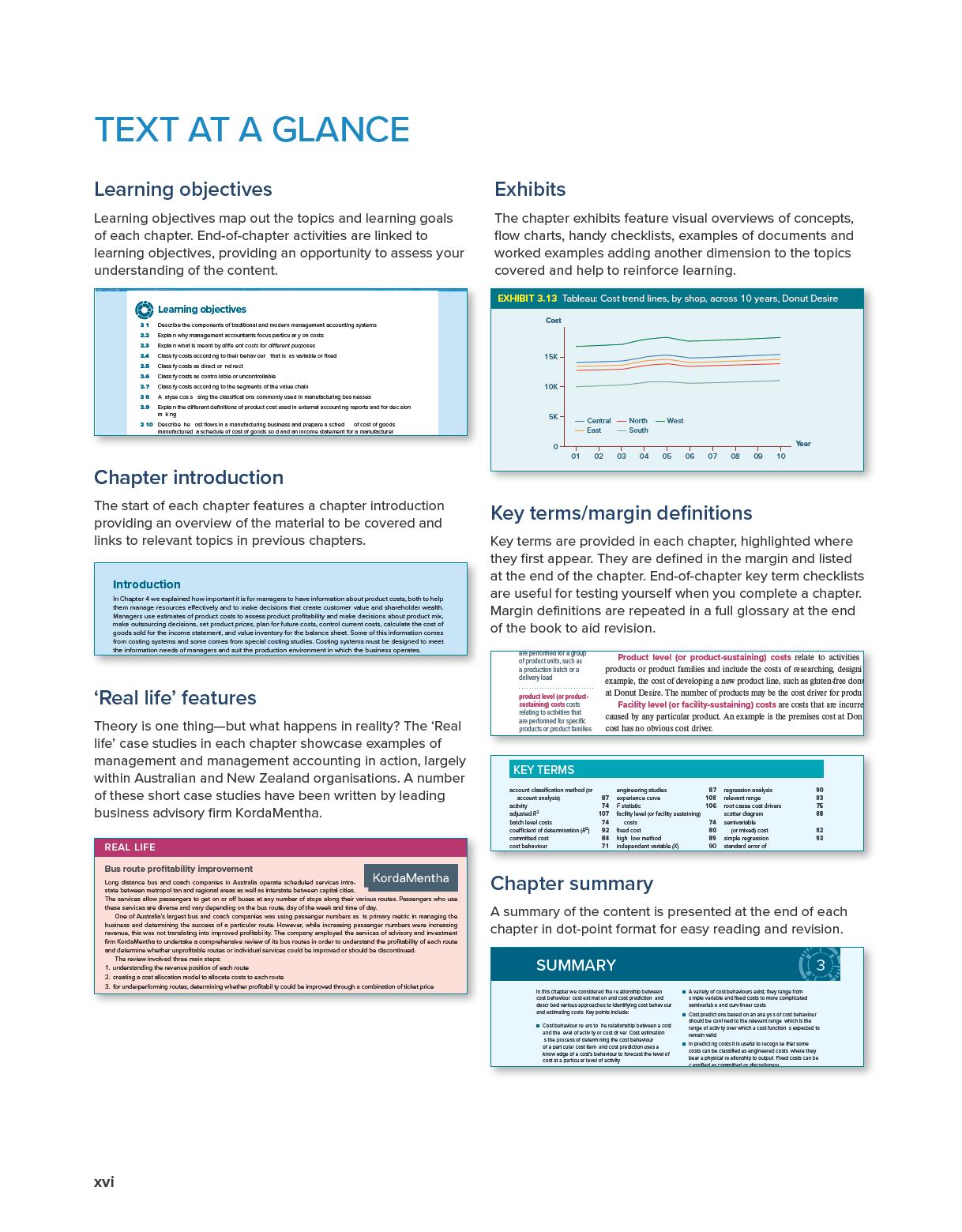Management Accounting, 9th EditioneBook PDF
Visit to download the full and correct content document: https://ebooksecure.com/download/management-accounting-9th-edition-ebook-pdf/












Visit to download the full and correct content document: https://ebooksecure.com/download/management-accounting-9th-edition-ebook-pdf/











Management accounting is a dynamic, constantly changing area. It must remain relevant to organisational needs in today’s business world of global markets, ir repressible innovation and digital disr uption. To understand the nature of management accounting practice, it is important to understand broader aspects of business practice across a range of areas, including strategy, marketing, human resource management, operations management and organisational behaviour. Management accounting both draws on and contributes to these areas.
Our approach in presenting this subject to students and managers is to focus on cutting-edge management accounting as practised by leading organisations in Australia and overseas, while at the same time acknowledging that some f irms are satisfied with more traditional approaches. A key way in which we do this is through the inclusion of ‘Real life’ examples, where we provide practical illustrations of how organisations employ the techniques descr ibed in the text. Many of the ‘Real life’ sections are new or have been updated. They reflect the latest in business practice and include a number of direct examples from client work conducted by leading business advisor y f irm KordaMentha. We have also substantially revised the end-of-chapter questions, exercises, problems and cases, revising up to half the questions in each chapter.
Since the f irst edition of this book appeared in the early 1990s, there have been dramatic changes in thinking about the role of management accounting in organisations. Once it was suf ficient to descr ibe management accounting as being concerned with providing information for planning and control, and for decision making. However, the role of management accounting is now more complex. It is now concer ned with the processes and technologies that enable the ef fective use of organisational resources to suppor t managers in enhancing customer and shareholder value. Supply chain management approaches provide a framework for integrating contemporary cost management and per formance measurement. The issue of sustainability is now increasingly important as businesses seek to understand and manage any adverse impact they have on the environment and society. Improvements in technology, and the development of data analytic and data visualisation tools also have potentially signif icant implications for the nature of the role of the management accountant. Our ninth edition includes substantial coverage of these issues in Chapter 3.
The processes and technologies of management accounting that enhance shareholder and customer value are evolving over time and require an intimate knowledge of the nature of the business, its markets, its strategy and its people. Someone working in the management accounting area in the 2020s needs to not only understand the internal characteristics of a business, but also have a detailed knowledge of competitors, customers and suppliers. Over the decades the practice of management accounting has developed to become more integrated with the process of management, and less a par t of the practice of accounting, with management accountants playing a signif icant role as par t of the management team. As such, management accountants have the ability to significantly shape an organisation’s strategic direction.
The book has been wr itten pr imarily as a text for one- or two-semester underg raduate management accounting courses. The references at the end of each chapter provide guidance on additional readings. With its descr iption of cur rent practice and strong emphasis on the new developments in management and management accounting, this book also provides a sound foundation for a management accounting unit within an MBA course.
While the or igins of this text can be traced to the US text, Managerial Accounting, by Ronald Hilton, it has always dif fered from its US counterpart. The Australian book takes a broad perspective in viewing management accounting as the ef ficient and ef fective use of resources, suppor ting managers in the improvement of customer and shareholder value. The rapidly changing business environment is seen as having implications for the development of new approaches to management accounting, as highlighted through the many ‘Real life’ cases presented in the book, which focus on cur rent management accounting practices and issues faced by organisations in Australia, New Zealand and the wider Asia–Pacific region.
We sincerely welcome any comments or suggestions from the lecturers and students who use this text.
Kim Langfield-Smith
David Smith
Paul Andon
Helen Thorne
Kim has a BEc from the University of Sydney, an MEc from Macquar ie University and a PhD from Monash University. She is a fellow of CPA Australia and a graduate of the Australian Institute of Company Directors. She is an emeritus professor at Monash University. Kim is also the principal of Langfield-Smith Consulting, advising universities and government on research strategy and performance, governance and compliance. During her academic career she was Vice Provost at Monash University and Professor of Management Accounting. Prior appointments were at La Trobe University, the Universities of Melbourne and Tasmania, and the University of Technology, Sydney.
Her research interests are in the area of management control systems, and she has published in journals including Accounting, Organizations and Society; Journal of Management Accounting Research; Management Accounting Research; Behavioral Research in Accounting; Journal of Accounting Literature; and Journal of Management Studies.

Kim has played an active role in the accounting profession. She was chair of the Professional Qualifications Advisor y Committee of CPA Australia, and a member of the Inter national Accounting Education Standards Board (IAESB), representing the CA ANZ and CPA Australia. In 2014 she received a Lifetime Achievement Award from CPA Australia.
David has a BCom (Honours) from La Trobe University and a PhD from Monash University. He is currently the Dean of the School of Accounting, Infor mation Systems and Supply Chain at RMIT University. He previously held professorial appointments at Monash University and the University of Queensland.
David’s research is in the area of management control systems, with a particular focus on performance measurement, and his research has been published in journals including Accounting, Organizations and Society; Management Accounting Research; Behavioral Research in Accounting; Journal of Accounting Literature; and Accounting, Auditing and Accountability Journal. He currently serves as an editor at Behavioral Research in Accounting and Accounting and Finance, as well as serving on several editorial boards.

David has been actively involved in the accounting profession and served as a board member of the Accounting and Finance Association of Australia and New Zealand (AFAANZ) for a number of years. David is also a past Chair of the Chartered Institute of Management Accountants’ (CIMA) Centre of Excellence Australasia Research Panel.
Paul has a BCom (Honours), MCom (Honours) and PhD from UNSW Sydney. He is a Professor in Accounting and Head of the School of Accounting, Auditing and Taxation at UNSW Sydney Paul is also a Fellow of Chartered Accountants Australia and New Zealand. Paul teaches and researches in the areas of management accounting, fraud and control systems. His research in these areas has been published in leading inter national journals, including Accounting, Organizations and Society; Journal of Management Studies; Management Accounting Research; Accounting, Auditing and Accountability Journal; Critical Perspectives on Accounting; and Journal of Business Ethics. Recently, Paul received a major Australian Government research grant to study offender strategies and other factors mitigating against the effectiveness of management controls to prevent/detect serious workplace fraud.

Before commencing his academic career, Paul worked in a large professional services fir m. He remains active in the accounting profession through his involvement with McGrathNicol’s Financial Crime Exchange. Paul was also previously involved in Chartered Accountants Australia and New Zealand’s CA Program.
Helen has a BEc and DipAcc from Flinders University, and a PhD from the University of Adelaide. She was Professor and Head of the Inter national Graduate School of Business at the University of South Australia. Helen has also held appointments in the Graduate School of Management and the Commerce Department at the University of Adelaide.
Her research focused on contemporary approaches to management accounting, including activity-based costing and strategic performance measurement systems, and she has published in a number of journals including Journal of Accounting Literature; Journal of Cost Management; Advances in Management Accounting; and Australian Accounting Review.

Before commencing her academic career, Helen worked as a management accountant with a major international company. Since then she has maintained her interests in the ‘real world’. She is a past member of CPA Australia and has undertaken consulting work in management accounting for a number of organisations in the manufacturing and service industries.
